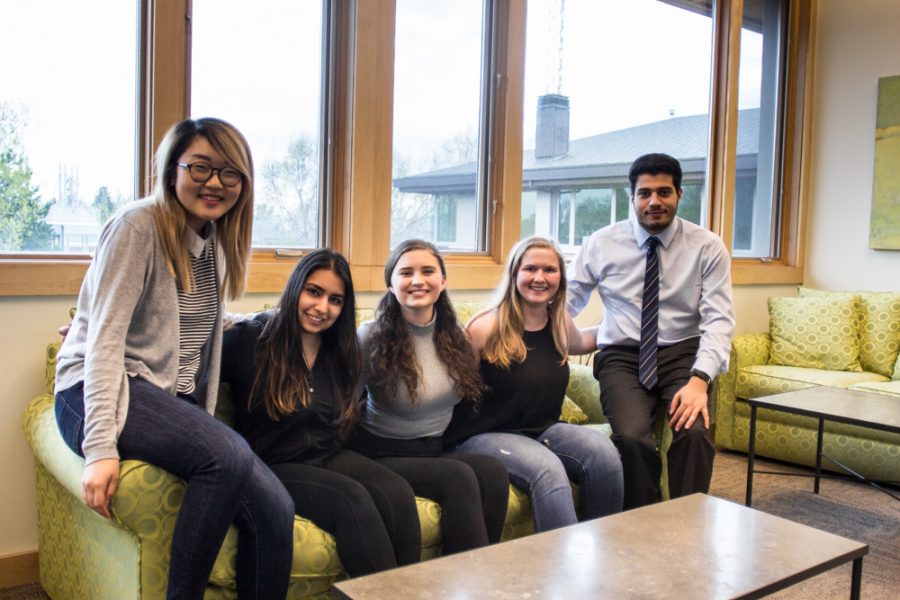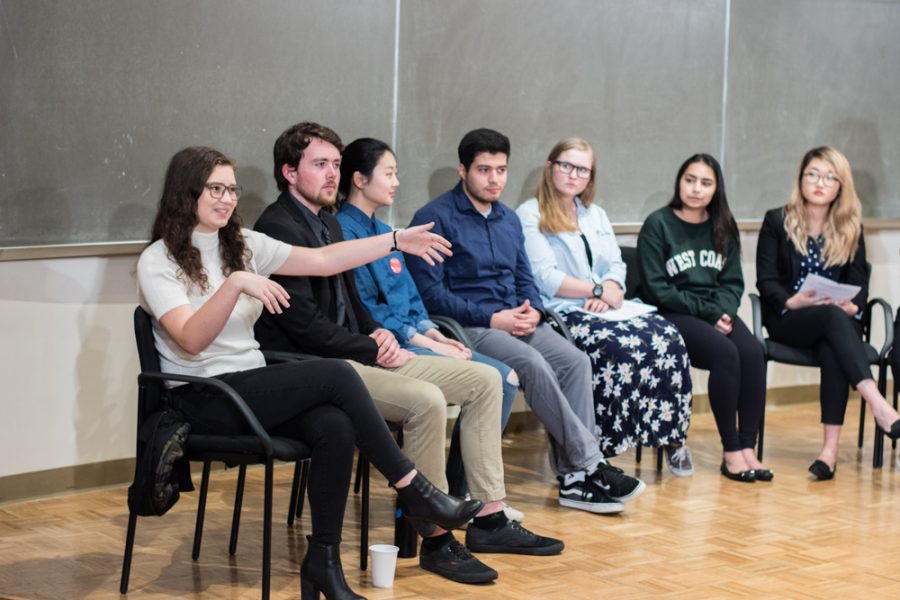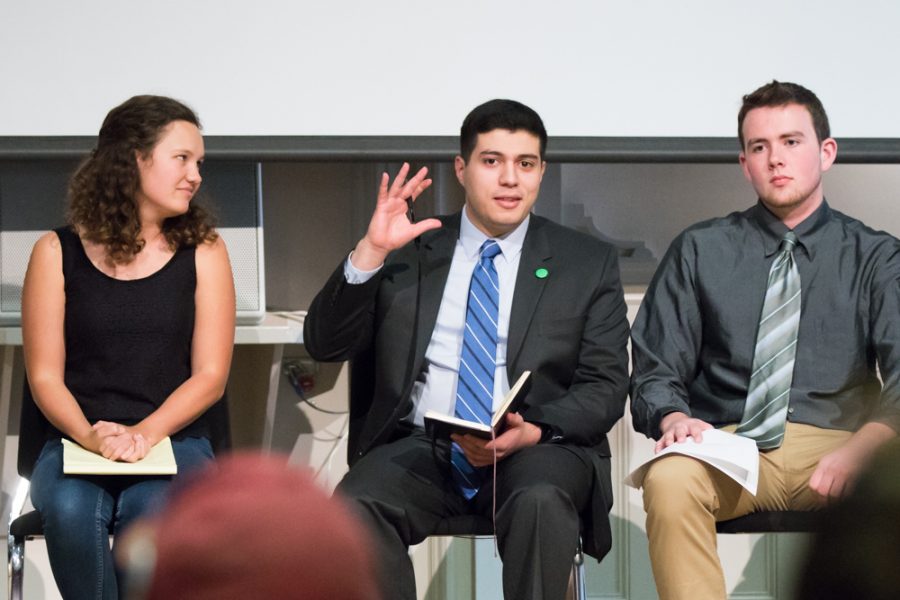ASWC representatives are preparing a resolution based on research of the process for granting tenure at Whitman’s 12 comparison colleges, in response to students’ desire to become more involved in the college’s process of hiring and granting tenure to professors.
Several controversial decisions in recent years have caused students to desire a greater voice in hiring and tenure decisions. The ASWC resolution is being drafted by Faculty Liaison junior Jack Percival, sophomore senator Dana Casterella and first-year senator Emily Bowen. This past spring, Percival and ASWC President senior Tatiana Kaehler began research of the tenure processes at Whitman’s 12 comparison colleges, which are selected by Whitman’s administration for being similar to Whitman. The resolution is projected to come before the ASWC at the end of this semester or the very beginning of the spring semester.
Percival believes the ASWC resolution that’s in progress presents a meaningful way to incorporate more student feedback, one that many other schools have already implemented. Percival said that the model ASWC will propose is based on the tenure process at Whitman’s 12 comparison colleges: letters of evaluation.
“The candidate generally submits … [the] names of students, former advisees, thesis advisees, etc., and the registrar will sometimes submit a list of students who have taken a couple classes with the professor to form two separate pools to limit bias. And so that’s kind of the model we’re gunning for,” said Percival.
Once the candidate and the registrar have provided these lists, the provost would then select a few students to provide letters of evaluation. Kaehler spoke to the benefits of this strategy.
“One of the main reasons we want to increase student input is because course evaluations do not give students the ability to speak about their professor’s mentorship outside of the classroom, and these letters would be a way of bringing that mentorship and their advising into the picture during the tenure process,” she said.
Professor of Physics Kurt Hoffman says that students might not be aware of how much of a voice they are already given.
“Currently, in the process students have quite a bit of influence, though they don’t really realize it. When the [Personnel] Committee is reviewing a faculty member’s portfolio, part of the process involves reading teaching evaluations from a class,” said Hoffman.
Hoffman, who is chair of the Personnel Committee, says that in his experience the student course evaluations always play a large part in the committee’s evaluation of a candidate’s teaching.
“They are documents that are read by everyone on the committee, so they are definitely taken seriously, and the information that we obtain from them is an important part of our conversation,” he said.
The central role of course evaluations in the Personnel Committee’s deliberations is one of the reasons that course evaluations were restructured for the fall 2012 semester to focus more on mentorship and advising, and they are now submitted online. This change was a part of the faculty response to a resolution on this same subject, student input in tenure decisions, which ASWC passed in the spring of 2012.
Associate Professor of Astronomy and General Studies Andrea Dobson, who was chair of faculty at the time the resolution was passed, credits the resolution with the improvement of the course evaluation system, but she concedes that the faculty chose not to implement all of the requests in that document, such as the possibility of direct student participation on the Personnel Committee.

“In terms of students actually sitting on the Personnel Committee, that was discussed and rejected,” said Dobson.
Interim Provost and Dean of Faculty Pat Spencer agreed that it’s not realistic for students to sit on the committee, in part due to the confidential nature of some of the information discussed.
“I think one of the things that concerns me most is that students tend to have a short horizon and a tenure decision is a 30-year commitment to the college. In that sense it’s best considered by a faculty committee. Having said that, I think there’s probably ways to incorporate student input. How that would happen, I don’t know,” said Spencer.
However, Hoffman remains unconvinced that further representation is necessary.
“There are a lot of evaluations for a faculty member by the time they’re coming up for a decision, so we have a large number of students giving us input. So I’m not sure that there’s a sense that faculty feel there’s a shortage of input from students,” said Hoffman.
Hoffman and Spencer both emphasized that professors don’t necessarily agree on this issue and that it was difficult for them to speak for the faculty at large. Even so, Spencer was optimistic that faculty would take the resolution seriously.
Dobson believes that a proposal highlighting student participation through letters of evaluation, as ASWC plans to propose, rather than direct representation on the committee, is more practical and would likely get a stronger reception.
“Whether it will result in anything or not, I don’t know, but I think [emphasizing letters of evaluation] is a more realistic approach, and I think it’s got quite a bit of merit,” said Dobson. “I could imagine that it might wind up the case that an additional letter or two or three were a part of a person’s personnel file when they’re coming up for consideration by the committee.”
Whether or not she would actually expect this model to be implemented, however, depends on how specific the resolution is.
Hoffman agreed that the reception of the resolution would hinge on the details.
“So, a solicited letter from specific students … the challenge is deciding how would we do that? What’s the process? Do we let the faculty member up for review request students? And what would be the impression of the committee or other readers if that’s how the students were identified?” he said. “I would want to make sure that that input was actually in a form that was actually meaningful.”
Whether or not the resolution will adequately address these concerns remains to be seen, but it is evident that many faculty members are at least willing to consider it.
“To a large extent it’s [the students’] college and I think they should have voices,” said Spencer.








